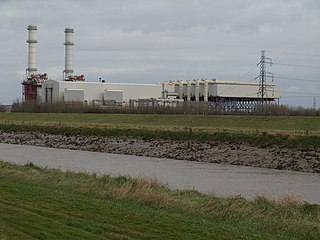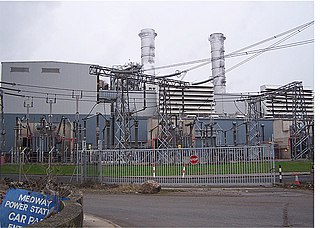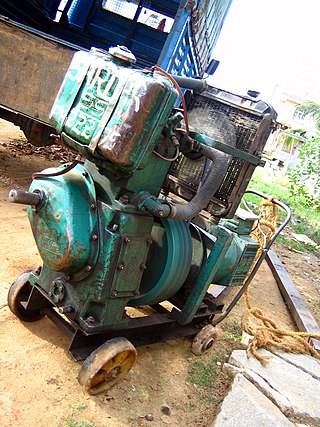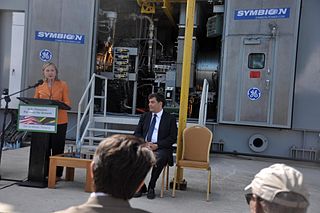
Peaking power plants, also known as peaker plants, and occasionally just "peakers", are power plants that generally run only when there is a high demand, known as peak demand, for electricity. Because they supply power only occasionally, the power supplied commands a much higher price per kilowatt hour than base load power. Peak load power plants are dispatched in combination with base load power plants, which supply a dependable and consistent amount of electricity, to meet the minimum demand.
The Power Holding Company of Nigeria (PHCN), formerly the National Electric Power Authority (NEPA), was a power company owned by the government of Nigeria. It represented Nigeria in the West African Power Pool. During the era when it operated as NEPA, the company managed a football team, NEPA Lagos.

Transnational Corporation plc, is a diversified conglomerate with strategic investments and core interests in the hospitality, agribusiness and energy sectors. A publicly quoted conglomerate with a diversified shareholders base of about 300,000 investors, its notable assets include Transcorp Hotels plc owner of Transcorp Hilton Hotel, Abuja and Aura by Transcorp Hotels; Transcorp Power Plc and Transcorp Energy Limited. As at 2023, Transcorp Group’s market capitalization is in excess of N540bn.

Sutton Bridge Power Station is an 819 MW gas-fired power station in Sutton Bridge in the south-east of Lincolnshire in South Holland, England. It is situated on Centenary Way close to the River Nene. It is a major landmark on the Lincolnshire and Norfolk border and on clear days with its bright red lights it can be easily seen as far away as Hunstanton.

Peterborough Power Station is a 360MW gas-fired power station at Eastern Industry, Fengate in the city of Peterborough, Cambridgeshire in the United Kingdom. It employs around forty people.

Little Barford Power Station is a combined cycle gas turbine power station in the village of Little Barford in Bedfordshire, England. It lies just south of the A428 St Neots bypass and east of the Wyboston Leisure Park. The River Great Ouse runs alongside. It was formerly the site of two coal-fired power stations, now demolished. The station is operated by RWE.

Medway Power Station is a 735 megawatts gas-fired combined cycle gas turbine (CCGT) power station on the Isle of Grain in Kent adjacent to the River Medway, about 44 miles east of London. It started to supply electricity to the national grid in 1995.
The Te Rapa cogeneration plant is a 44 MW cogeneration plant owned and operated by Contact Energy. It is located at the Fonterra dairy factory, at Te Rapa near Hamilton in New Zealand, and was commissioned in 1999.
The Nigerian National Integrated Power Project (NIPP) was conceived in 2004 when Olusegun Obasanjo was the President of the Federal Government of Nigeria. It was formed to address the issues of insufficient electric power generation and excessive gas flaring from oil exploration in the Niger Delta region. Seven power plants were designed in gas-producing states as part of the project.
Nigerian Electricity Regulatory Commission(NERC) is an independent regulatory body with authority for the regulation of the electric power industry in Nigeria. NERC was formed in 2005 under the Obasanjo administration’s economic reform agenda through the Electric Power Sector Reform Act, 2005 for formation and review of electricity tariffs, transparent policies regarding subsidies, promotion of policies that are efficient and environmentally friendly, and also including forming and enforcing of standards in the creation and use of electricity in Nigeria. NERC was instituted primarily to regulate the tariff of Power Generating companies owned or controlled by the government, and any other generating company which has a licence for power generation and transmission of energy, and distribution of electricity.

In 2018, Nigeria's primary energy consumption was about 155 Mtoe. Most of the energy comes from traditional biomass and waste, which accounted for 73.5% of total primary consumption in 2018. The rest is from fossil fuels (26.4%) and hydropower.

Heirs Holdings is a family-owned investment holding company headquartered in Lagos, Nigeria with investment interests in various sectors in Africa.
The Nigerian Bulk Electricity Trading (NBET) Plc. (NBET) is the manager and administrator of the electricity pool in the Nigerian electricity supply industry (NESI). It was incorporated on the 29th day of July 2010 and is 100% owned by the Federal Government of Nigeria.

The Nigerian energy supply crisis refers to the ongoing failure of the Nigerian power sector to provide adequate electricity supply to domestic households and industrial producers despite a rapidly growing economy, some of the world's largest deposits of coal, oil, and gas and the country's status as Africa's largest oil producer. Currently, only 45% of Nigeria's population is connected to the energy grid whilst power supply difficulties are experienced around 85% of the time and almost nonexistent in certain regions. At best, average daily power supply is estimated at four hours, although several days can go by without any power at all. Neither power cuts nor restorations are announced, leading to calls for a load shedding schedule during the COVID-19 lockdowns to aid fair distribution and predictability.
The electricity sector in Nigeria generates, transmits and distributes megawatts(MW) of electric power that is significantly less than what is needed to meet basic household and industrial needs. Nigeria has twenty-three (23) power-generating plants connected to the national grid with the capacity to generate 11,165.4 MW of electricity. These plants are managed by generation companies (GenCos), independent power providers, and Niger Delta Holding Company. In 2012, the industry labored to distribute 5,000 MW, very much less than the 40,000 MW needed to sustain the basic needs of the population. This deficit is also exacerbated by unannounced load shedding, partial and total system collapse and power failure. To meet demand, many households and businesses resort to purchasing generating sets to power their properties; this source of energy provided 6,000 MW in 2008. Nigeria has a chronic electricity shortage that has affected the country for many years. In 2022, its power grid collapsed twice in one week.

Copperbelt Energy Corporation Plc (CEC) is a Zambian electricity generation, transmission, distribution and supply company with operations in Zambia and Nigeria. The company is listed on the Lusaka Stock Exchange

Ubungo II Thermal Power Station was an extension to the Ubungo I Power Station and began commercial operations in 2012. The power-plant is located in Ubungo of Ubungo District in Dar es Salaam Region of Tanzania. The plant has an installed capacity of 100 megawatts (130,000 hp).
The Escravos–Lagos Pipeline System (ELPS) is a natural gas pipeline built in 1989 to supply gas from Escravos region of Niger Delta area to Egbin power station near Lagos in Nigeria. Subsequent spur lines from the ELP supply Delta power plant at Ughelli, Warri Refining and Petrochemicals Company at Ekpan, Uvwie. The West African Portland Cement (WAPCO) Plants at Shagamu and Ewekoro, industries at Ikorodu, City Gate in lkeja Lagos. Since the NIPP power plants emerged, ELPS is the major gas supply artery to the power plants in Nigeria.
Channel Island Power Station is the largest power station in the Northern Territory of Australia. It is positioned on an island in the Middle Arm of Darwin Harbour, supplying electricity to the Darwin-Katherine Interconnected System. It is currently owned and operated by Territory Generation. Most of the island surrounding the facility is protected from development as the Channel Island Conservation Reserve.










